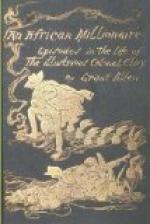But the magazine editor summed up all in a word. “Don’t believe that nonsense about fortunes being made by industry and ability,” he said. “In life, as at cards, two things go to produce success—the first is chance; the second is cheating.”
XI
THE EPISODE OF THE BERTILLON METHOD
We had a terrible passage home from New York. The Captain told us he “knew every drop of water in the Atlantic personally”; and he had never seen them so uniformly obstreperous. The ship rolled in the trough; Charles rolled in his cabin, and would not be comforted. As we approached the Irish coast, I scrambled up on deck in a violent gale, and retired again somewhat precipitately to announce to my brother-in-law that we had just come in sight of the Fastnet Rock Lighthouse. Charles merely turned over in his berth and groaned. “I don’t believe it,” he answered. “I expect it is probably Colonel Clay in another of his manifold disguises!”
At Liverpool, however, the Adelphi consoled him. We dined luxuriously in the Louis Quinze restaurant, as only millionaires can dine, and proceeded next day by Pullman car to London.
We found Amelia dissolved in tears at a domestic cataclysm. It seemed that Césarine had given notice.
Charles was scarcely home again when he began to bethink him of the least among his investments. Like many other wealthy men, my respected connection is troubled more or less, in the background of his consciousness, by a pervading dread that he will die a beggar. To guard against this misfortune—which I am bound to admit nobody else fears for him—he invested, several years ago, a sum of two hundred thousand pounds in Consols, to serve as a nest-egg in case of the collapse of Golcondas and South Africa generally. It is part of the same amiable mania, too, that he will not allow the dividend-warrants on this sum to be sent to him by post, but insists, after the fashion of old ladies and country parsons, upon calling personally at the Bank of England four times a year to claim his interest. He is well known by sight to not a few of the clerks; and his appearance in Threadneedle Street is looked forward to with great regularity within a few weeks of each lawful quarter-day.
So, on the morning after our arrival in town, Charles observed to me, cheerfully, “Sey, I must run into the City to-day to claim my dividends. There are two quarters owing.”
I accompanied him in to the Bank. Even that mighty official, the beadle at the door, unfastened the handle of the millionaire’s carriage. The clerk who received us smiled and nodded. “How much?” he asked, after the stereotyped fashion.
“Two hundred thousand,” Charles answered, looking affable.
The clerk turned up the books. “Paid!” he said, with decision. “What’s your game, sir, if I may ask you?”
“Paid!” Charles echoed, drawing back.




